Question: Question 1(Multiple Choice Worth 2 points) (01.06 HC) The following table shows the marginal utility that Renee receives from consuming hamburgers and hotdogs. Hamburgers Consumed
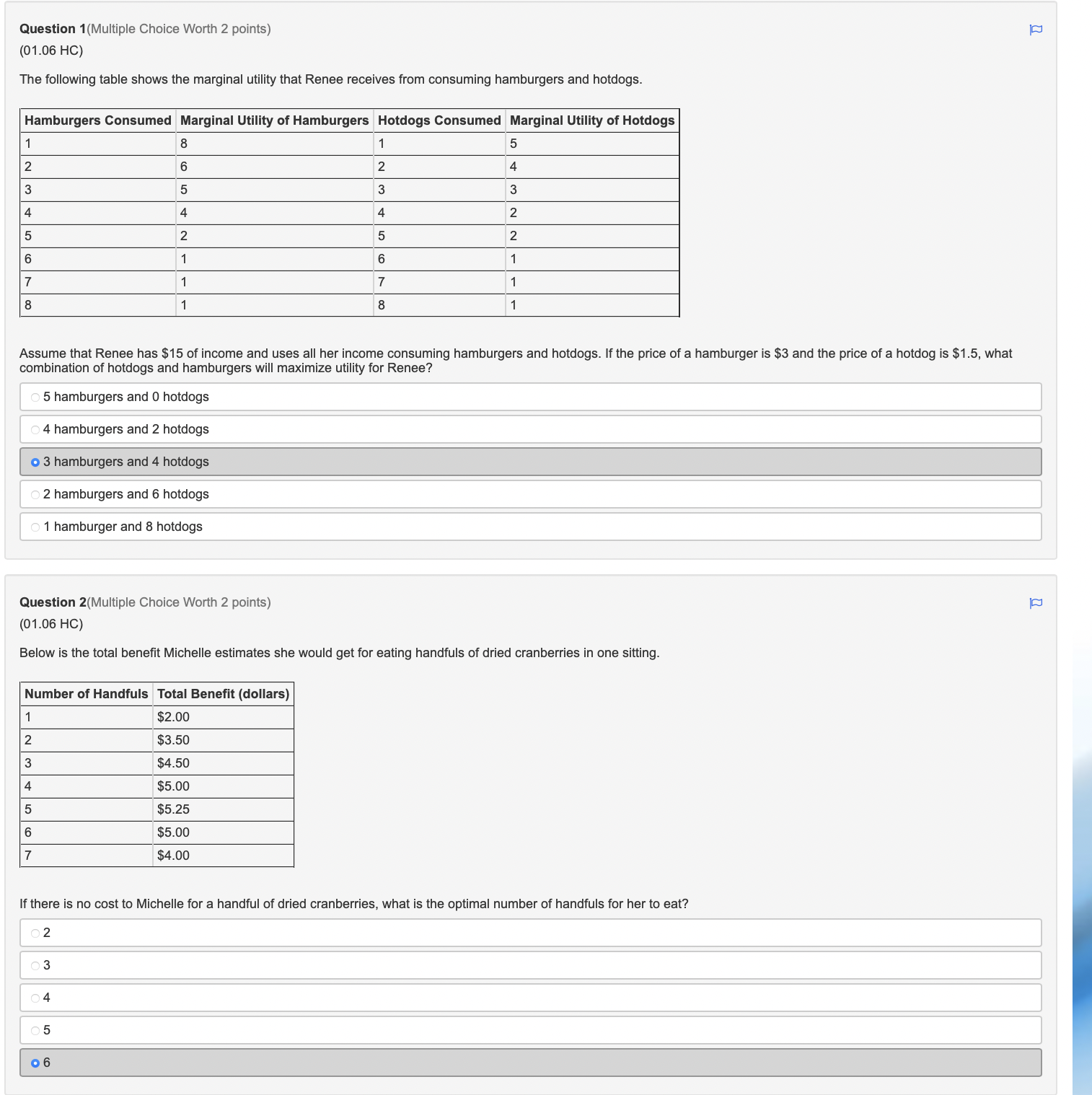
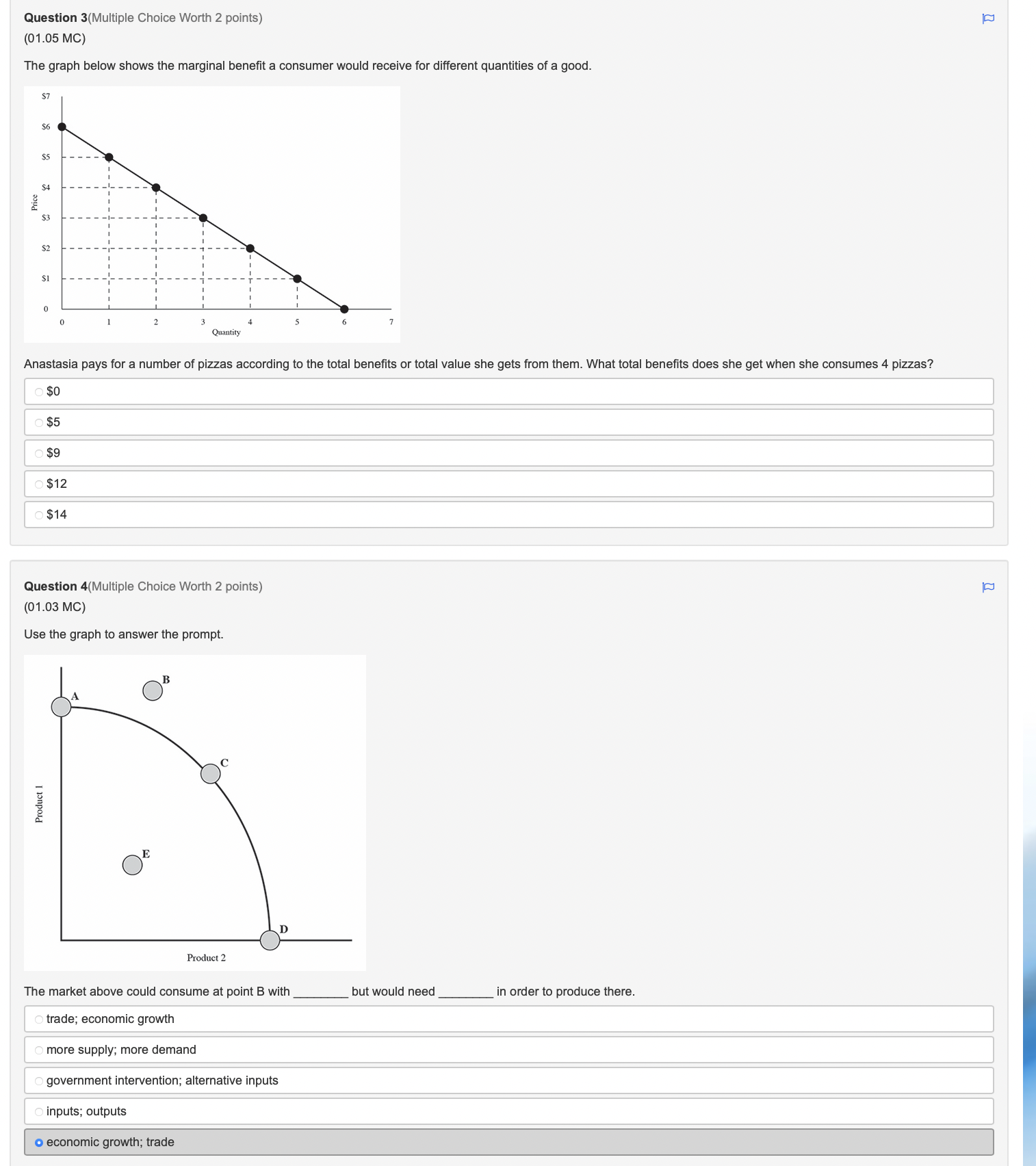
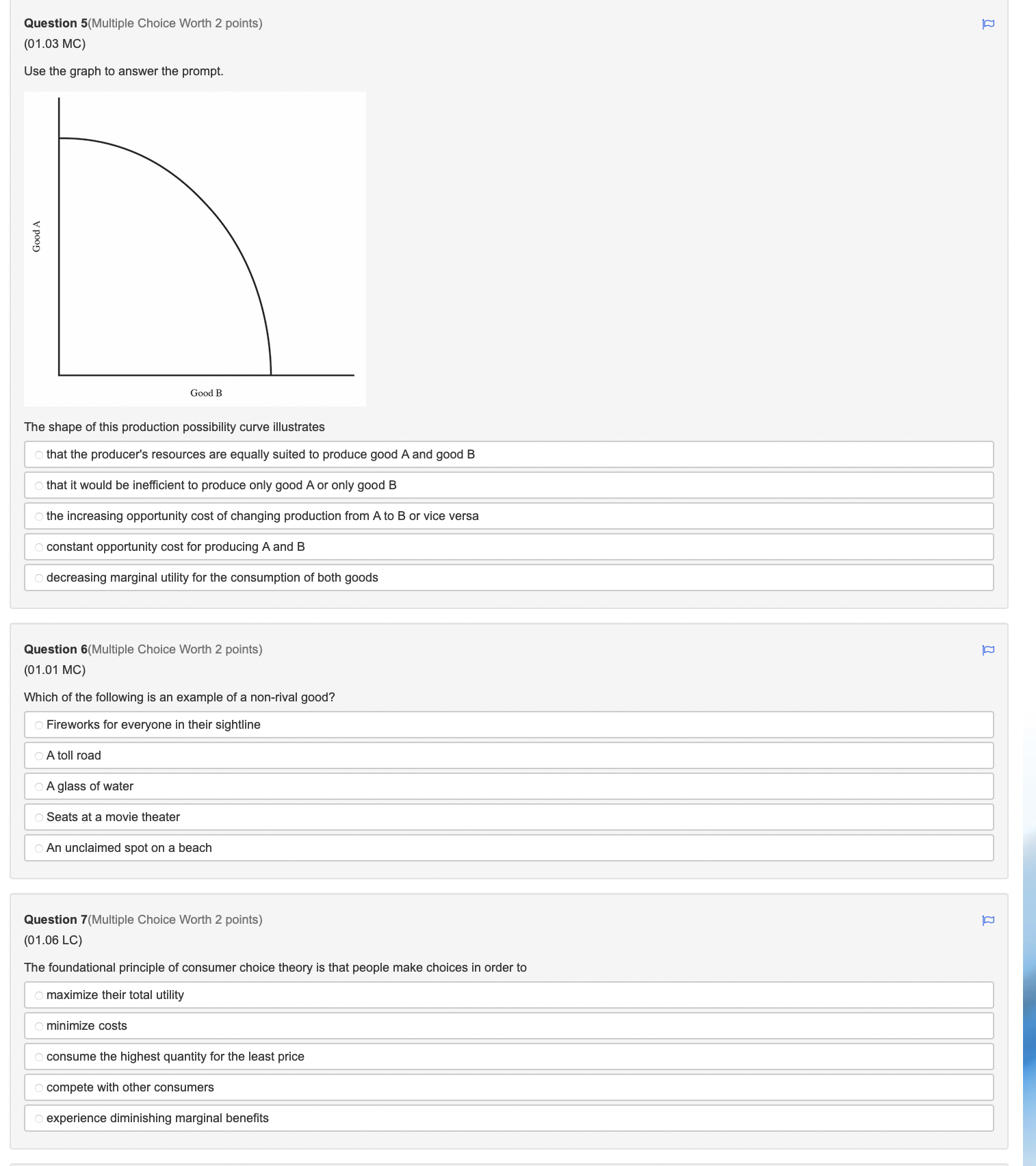
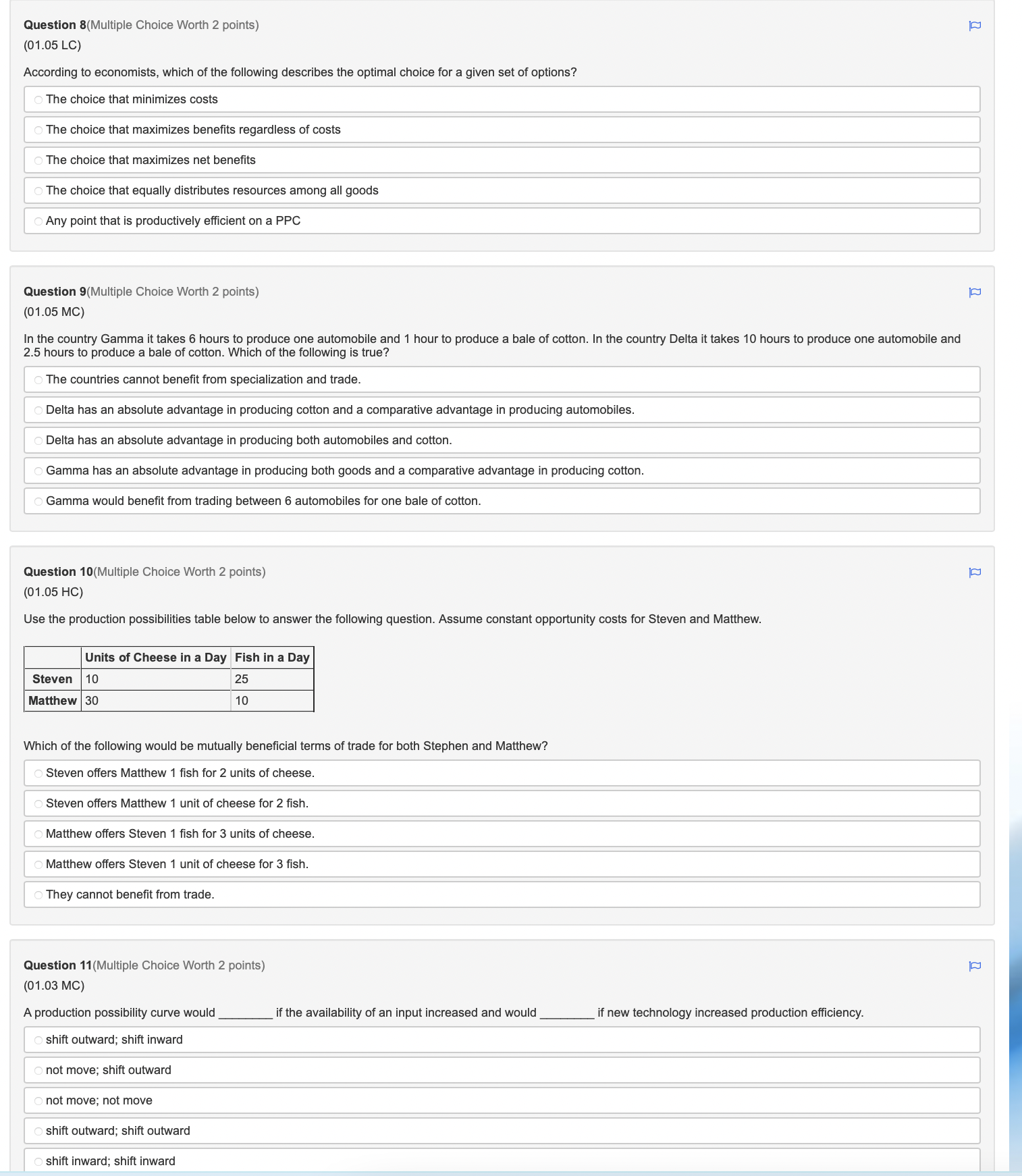
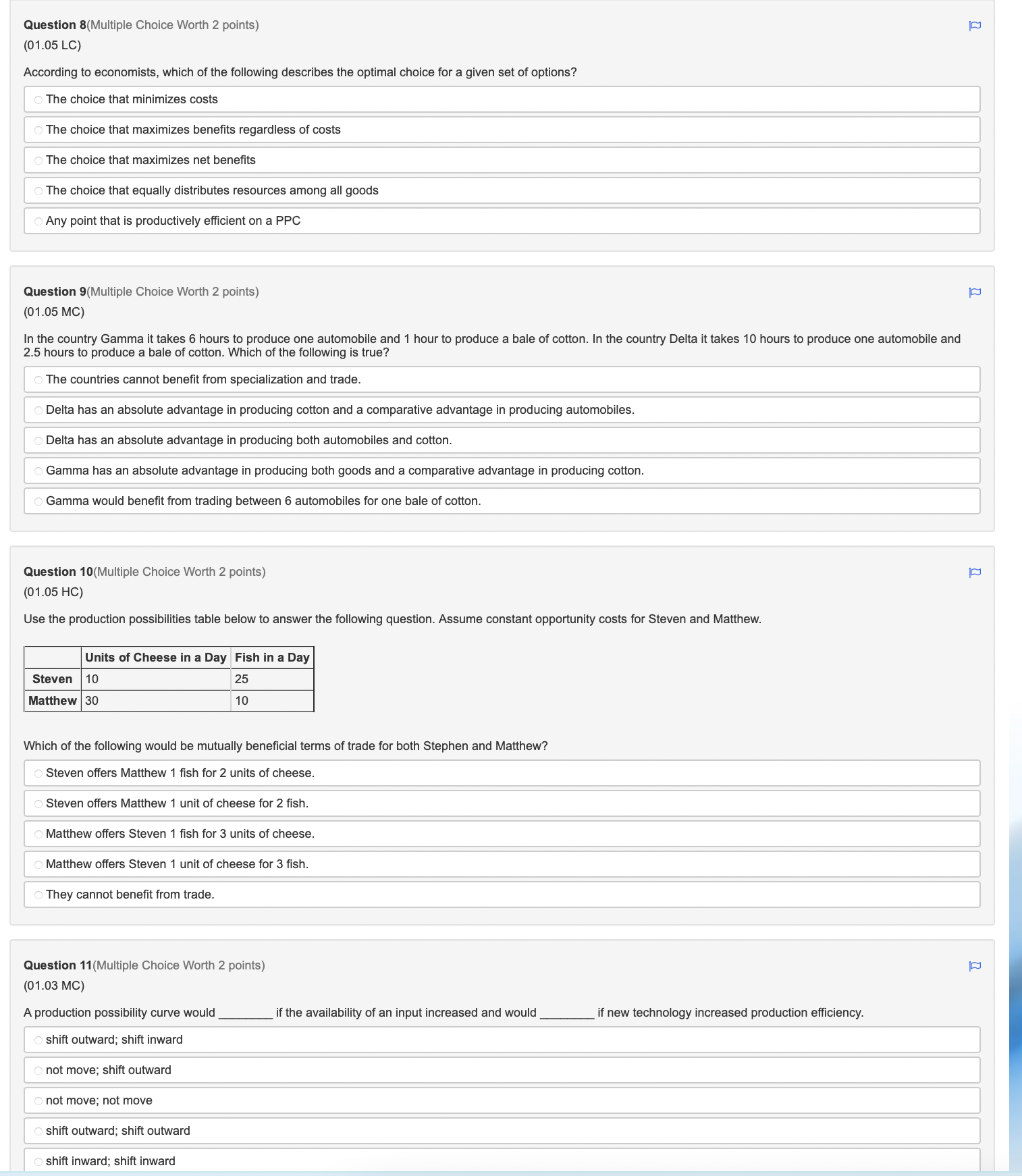
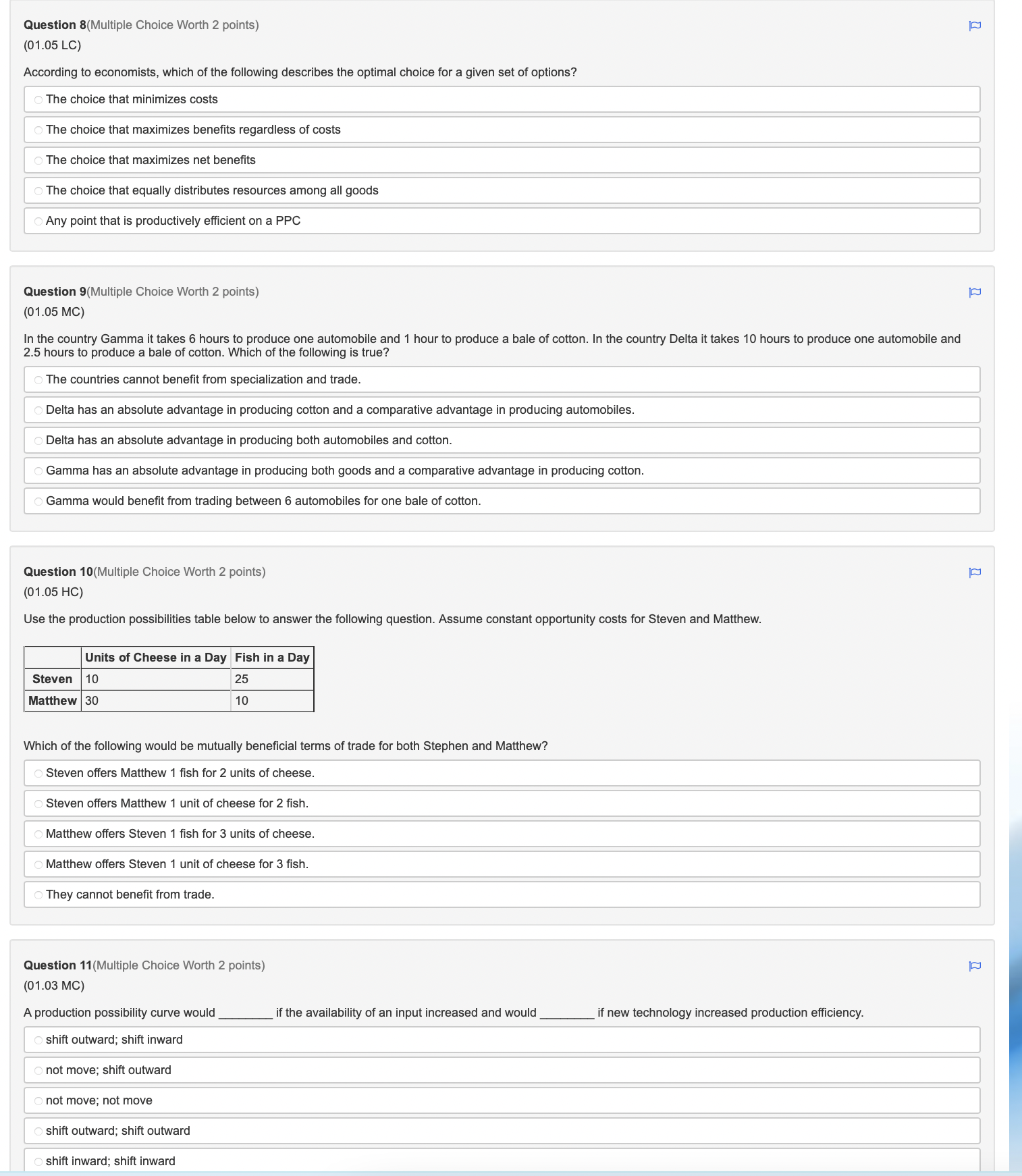
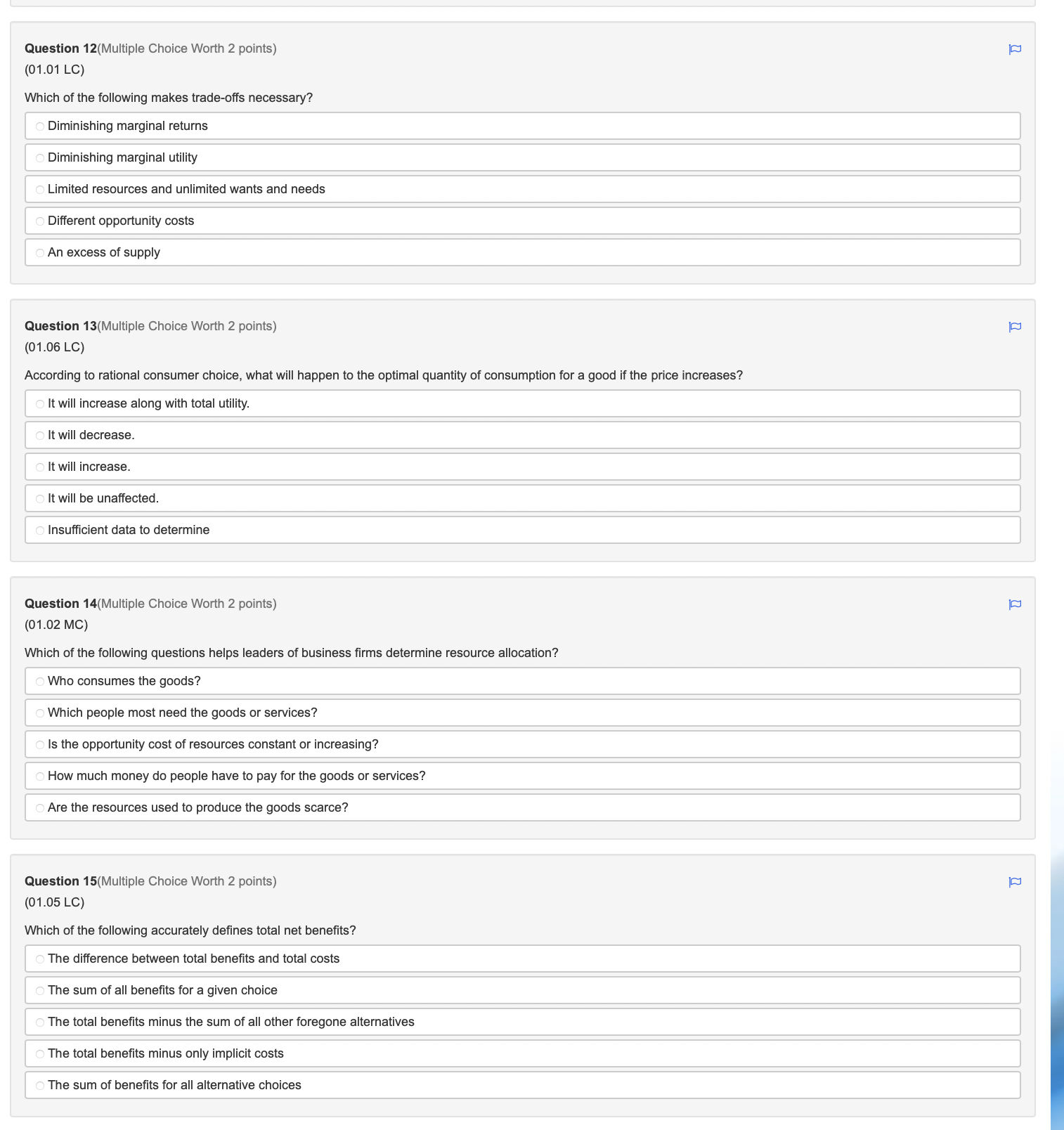
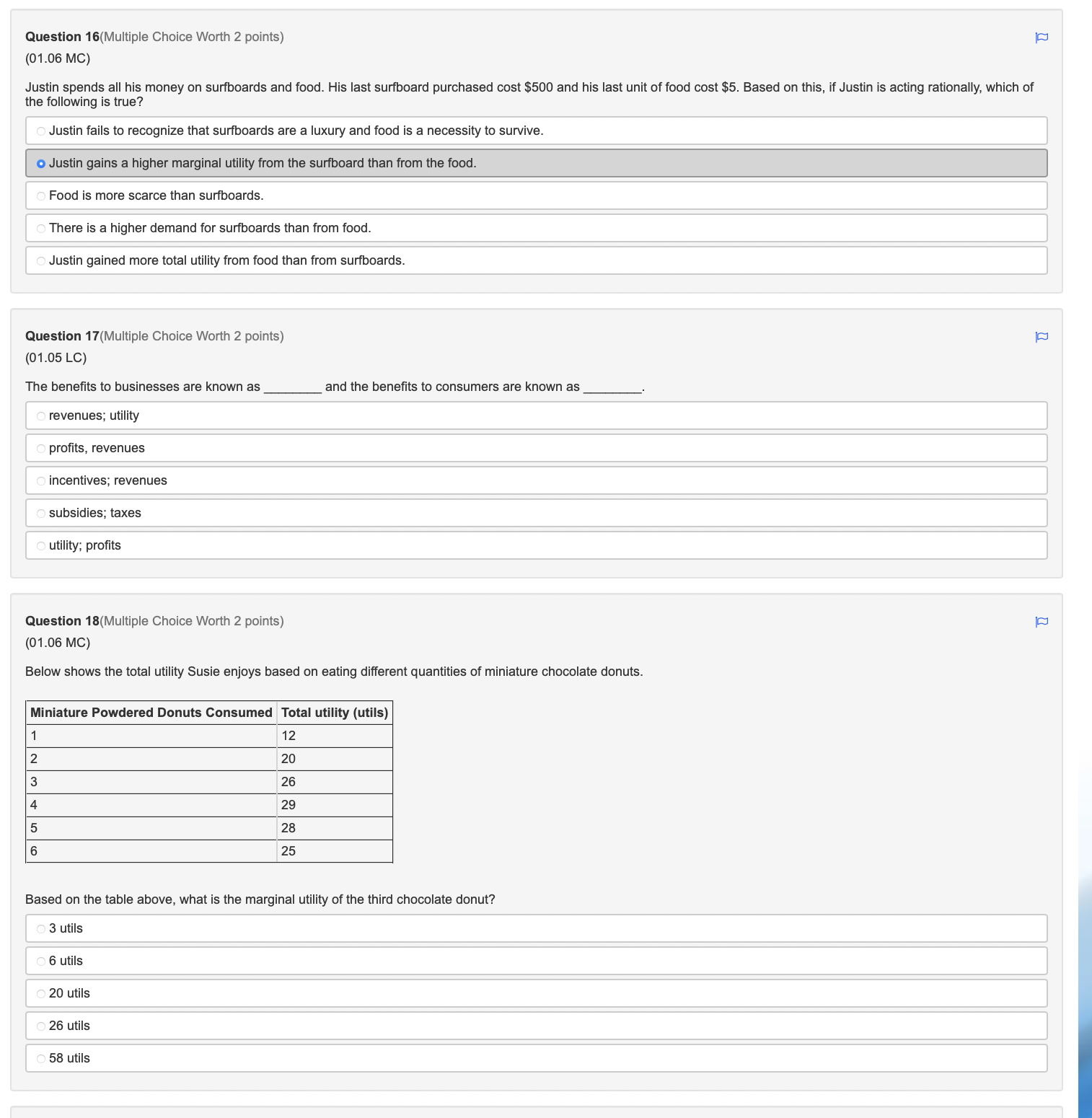
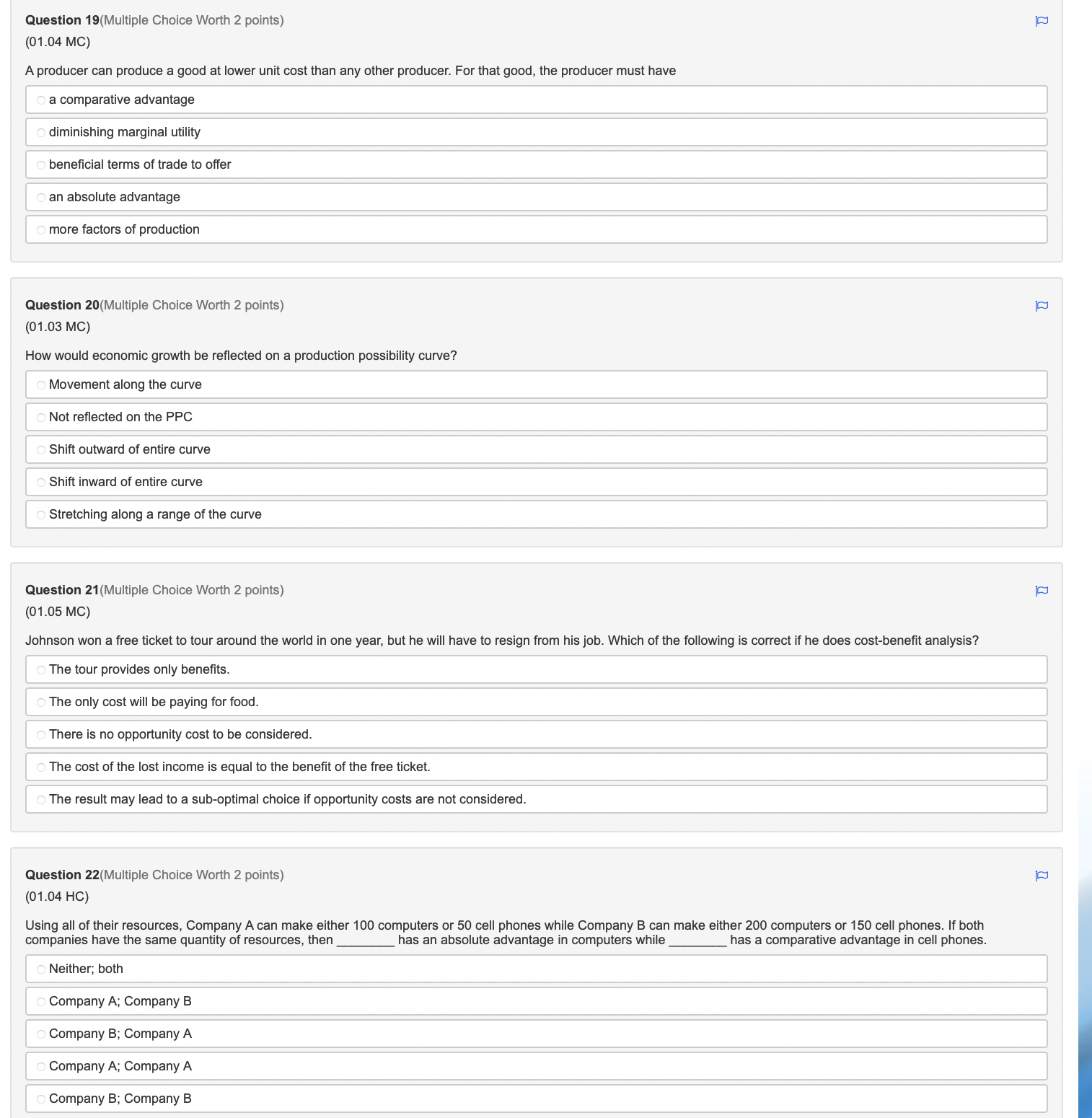
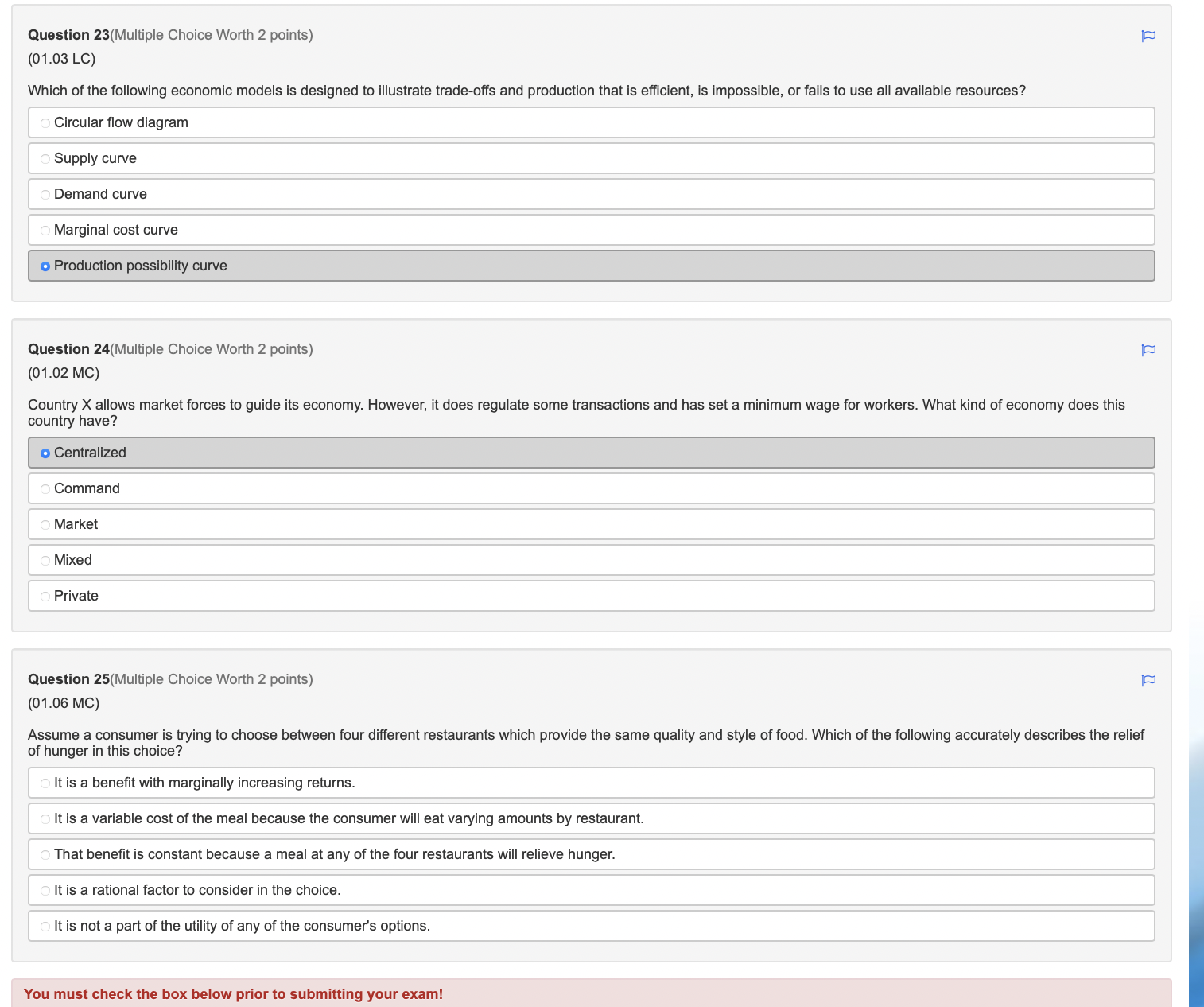
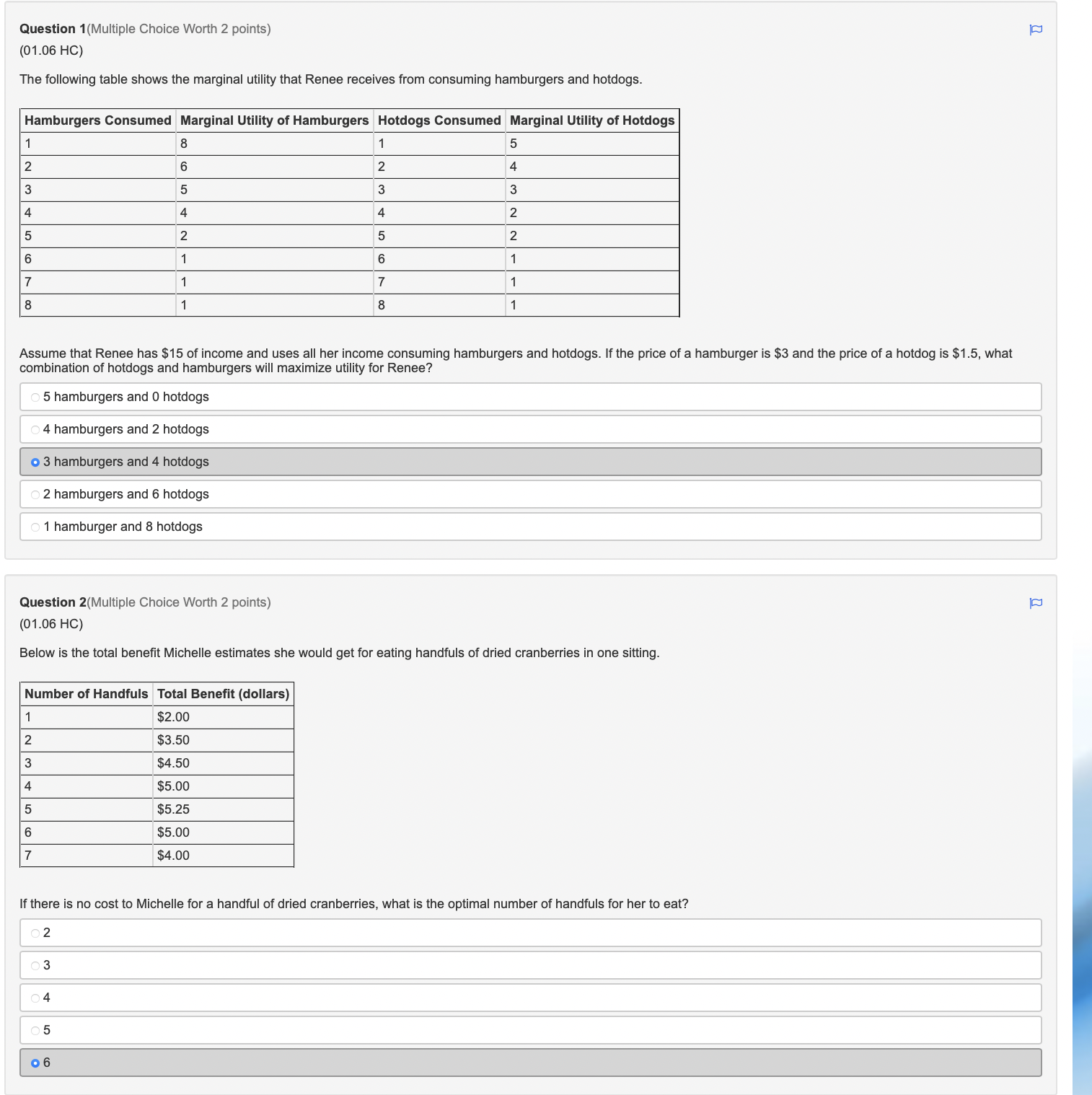
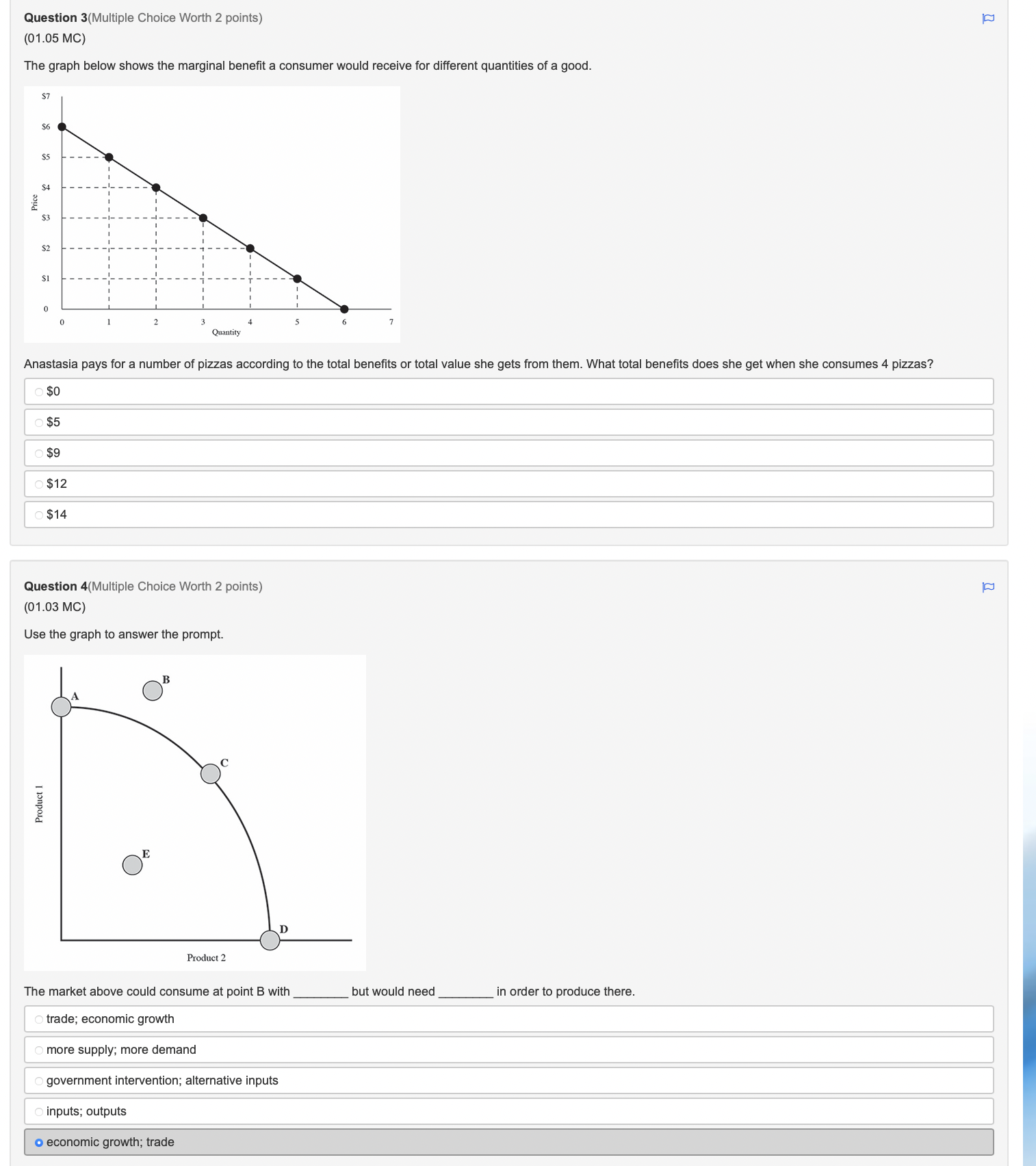
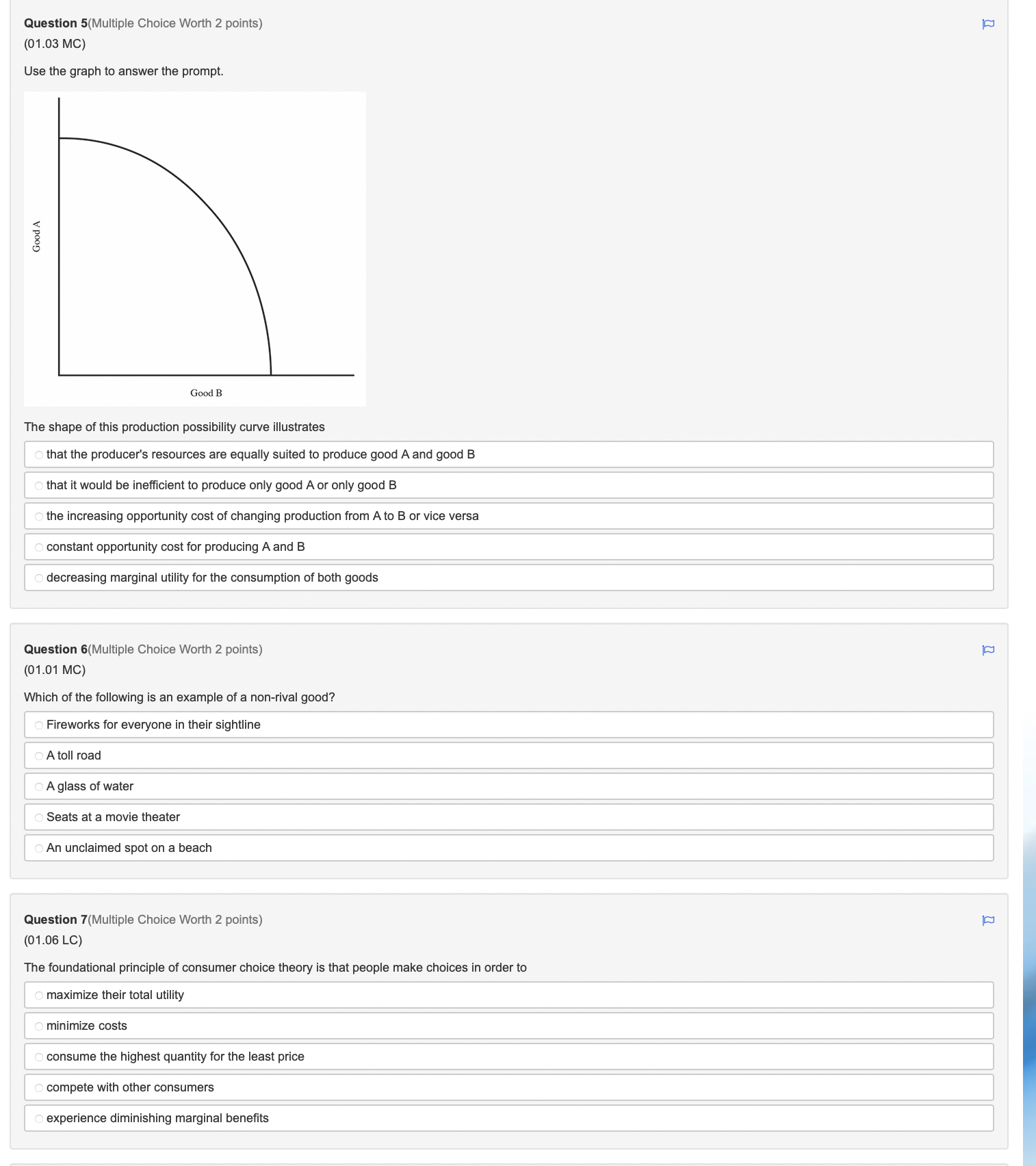
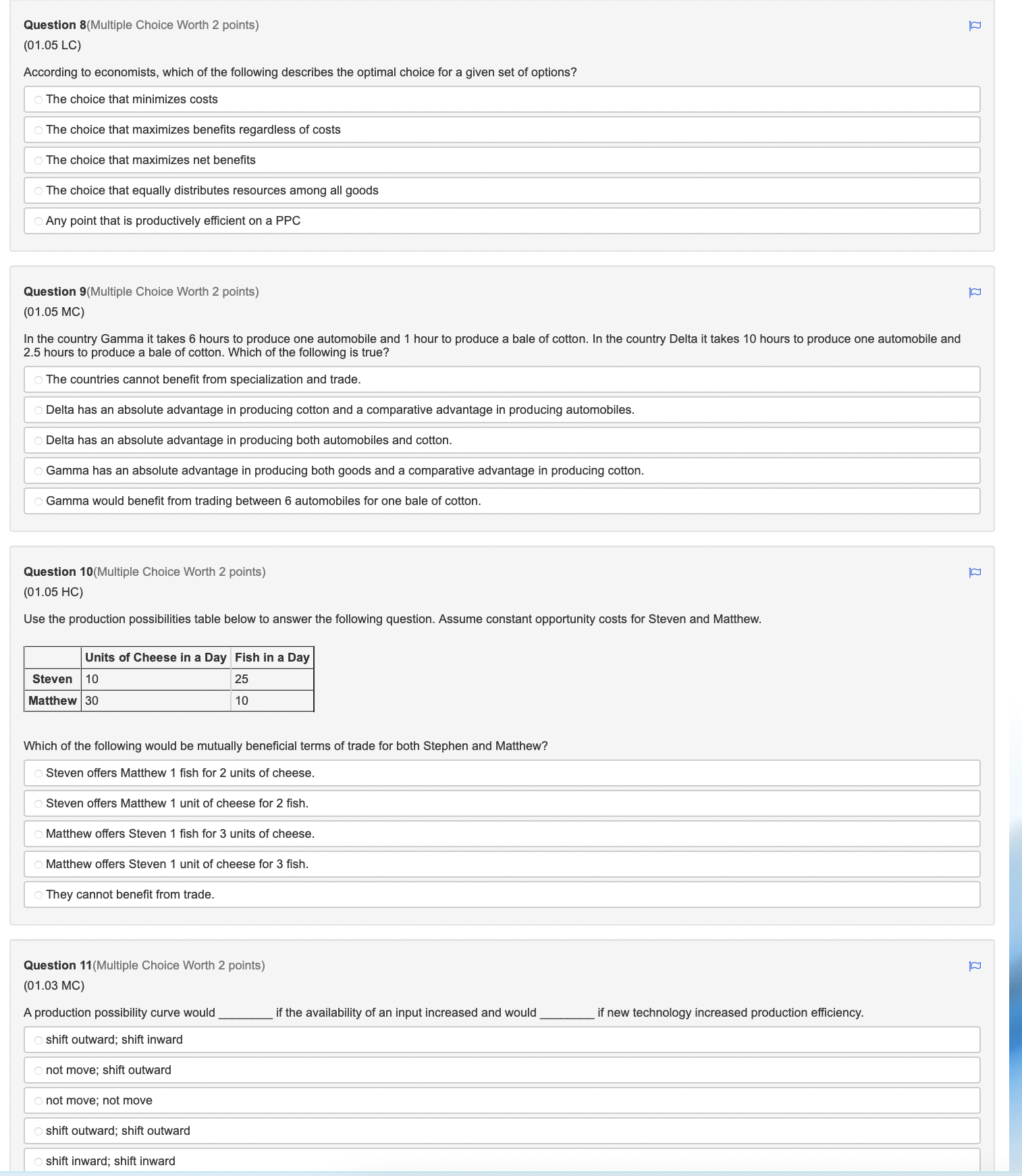
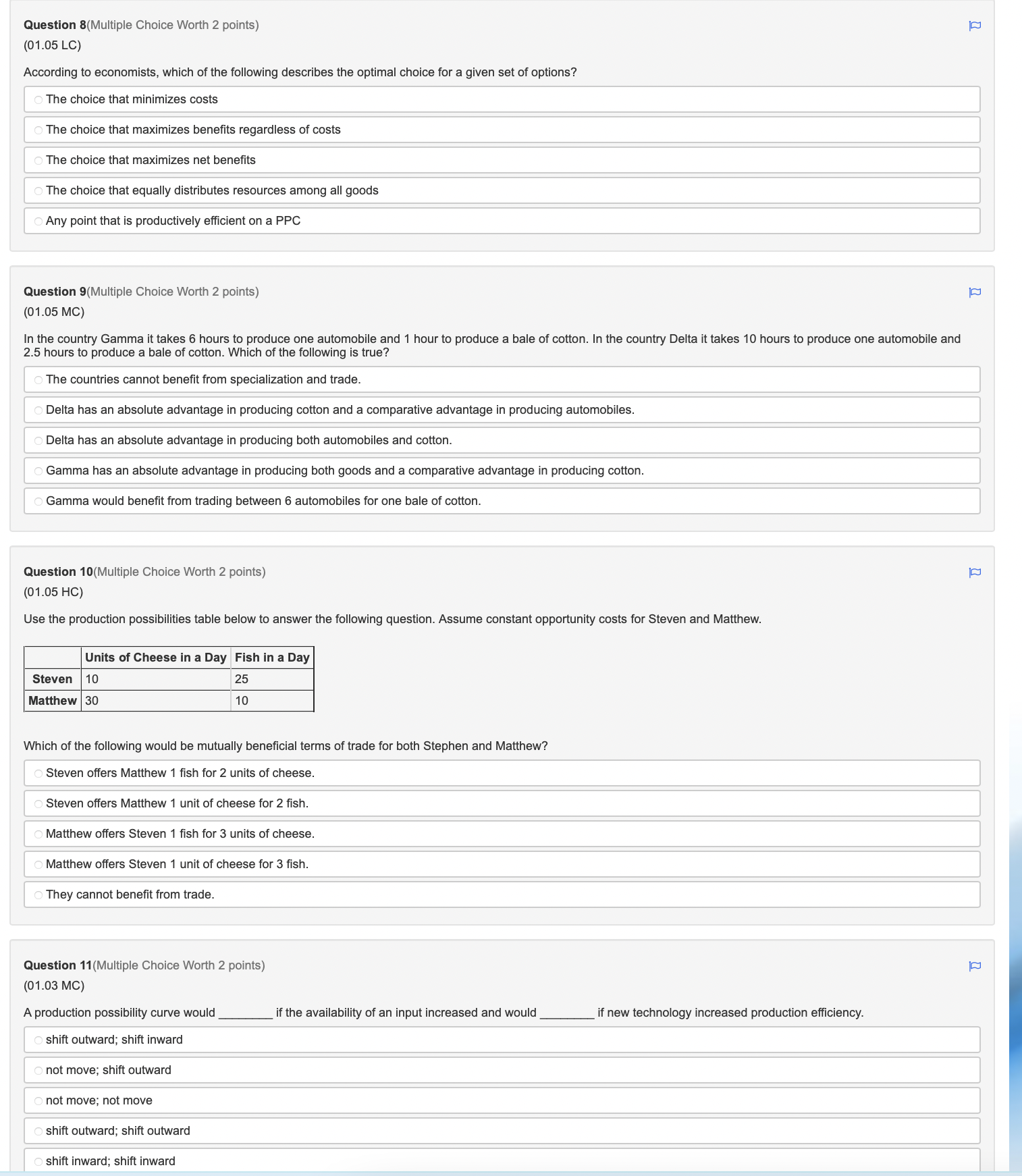
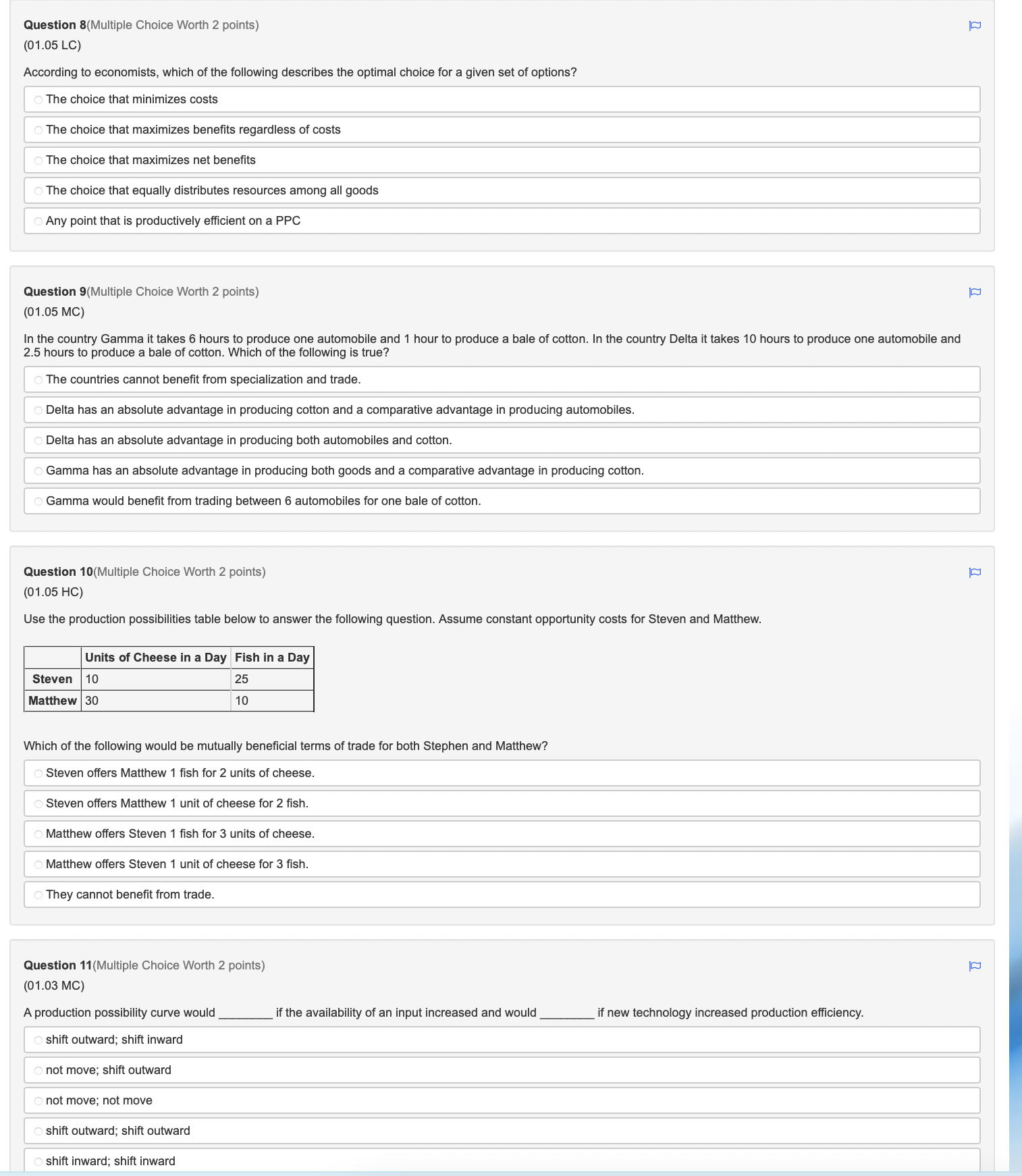
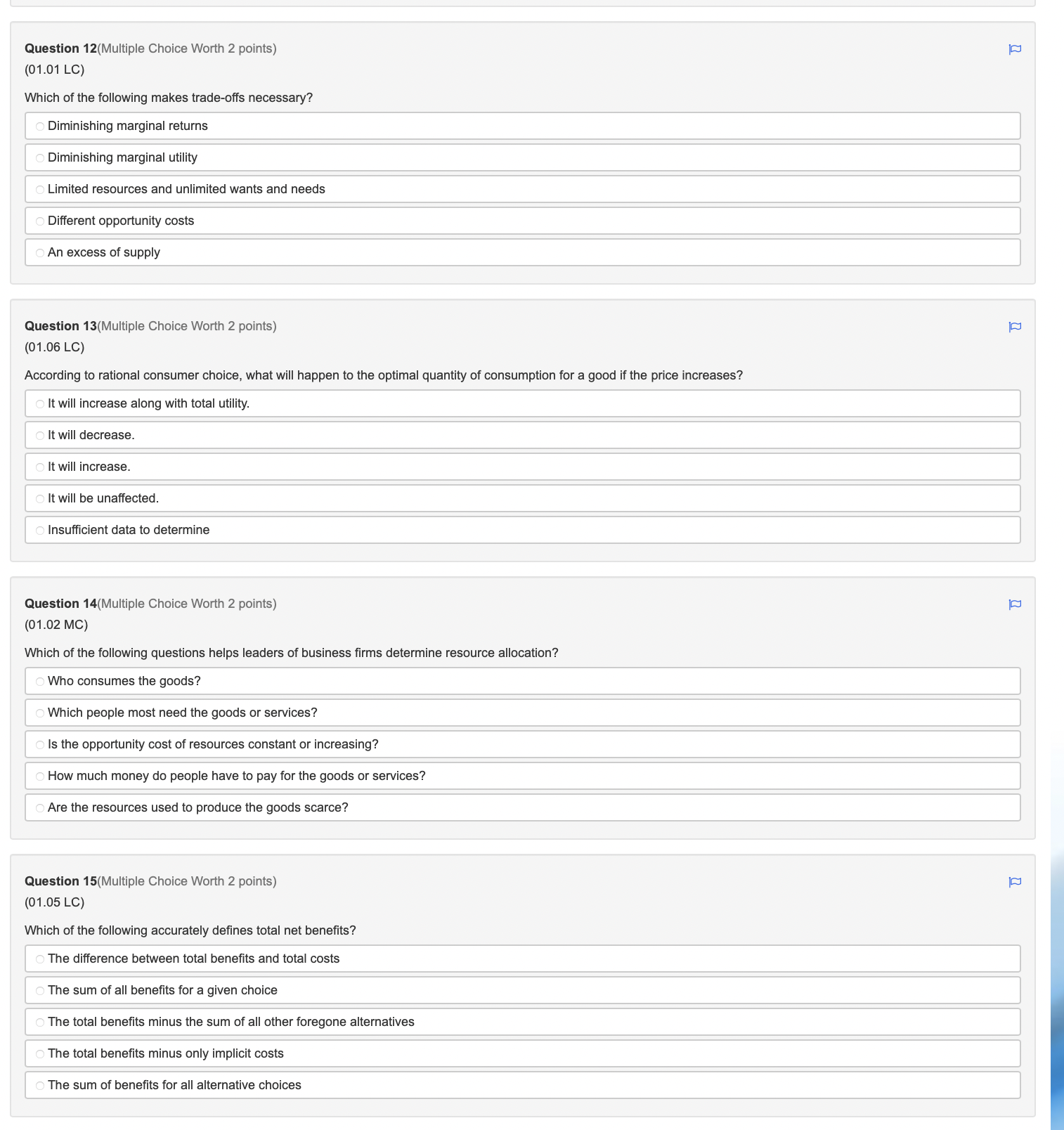
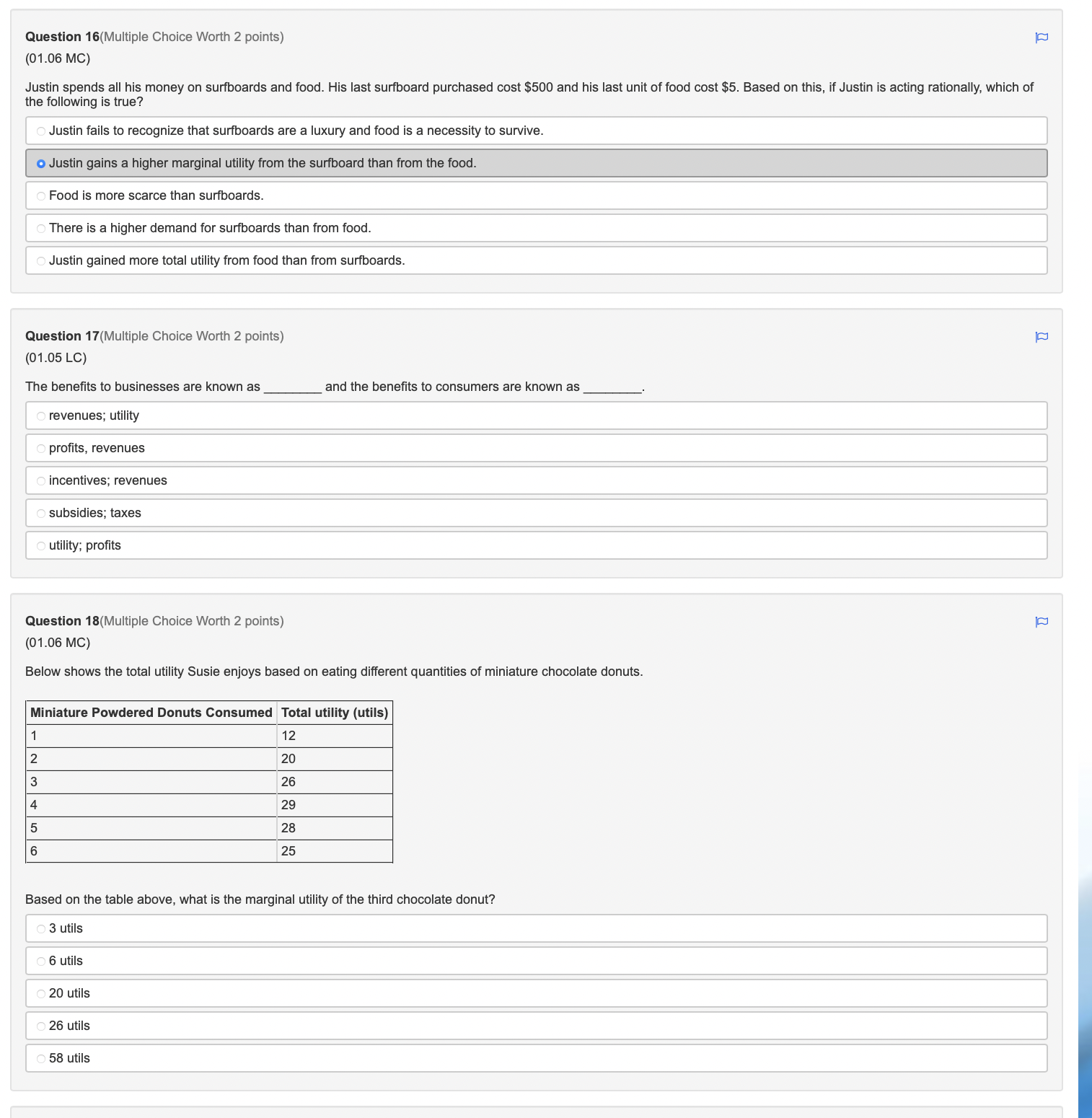
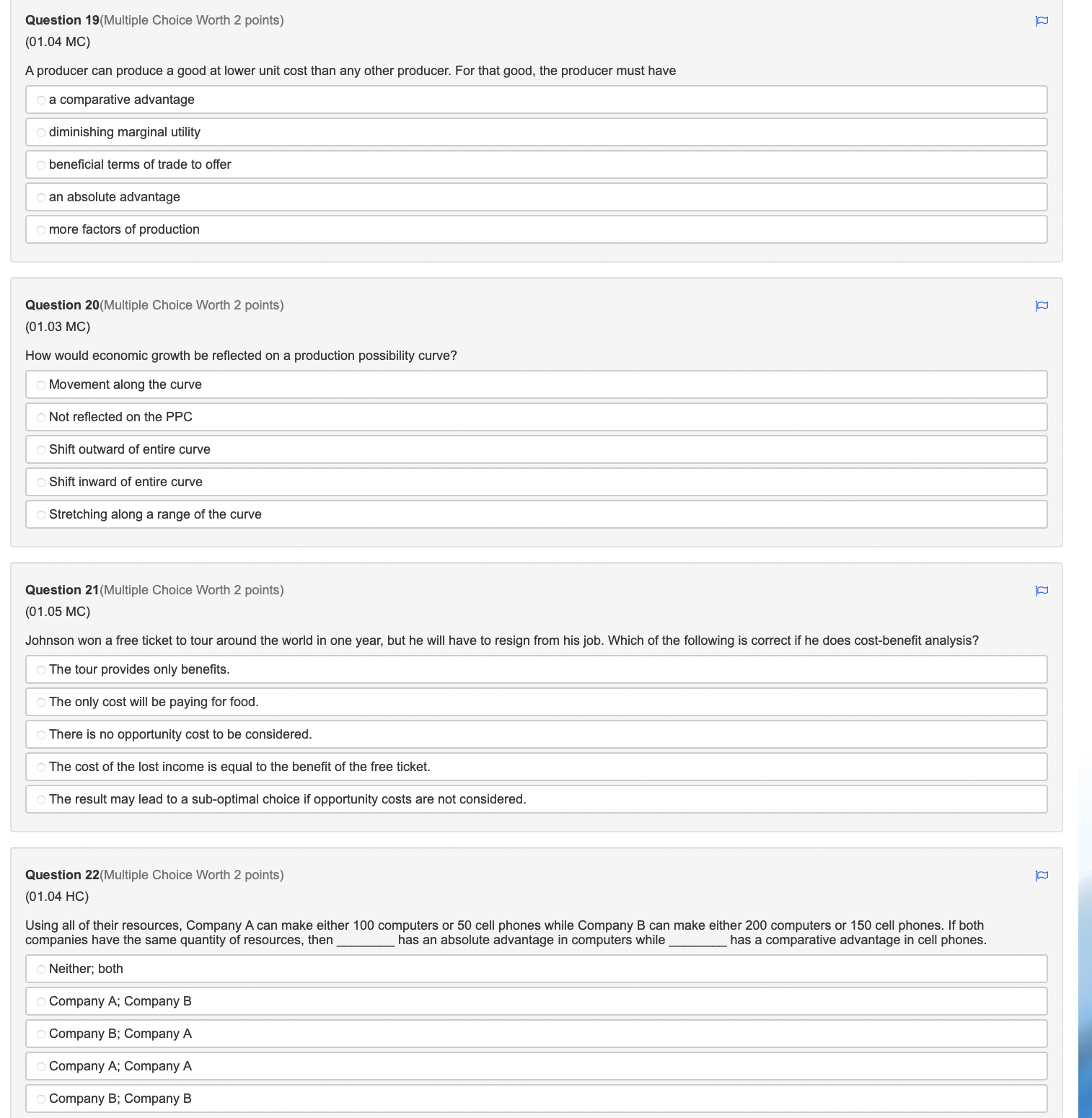
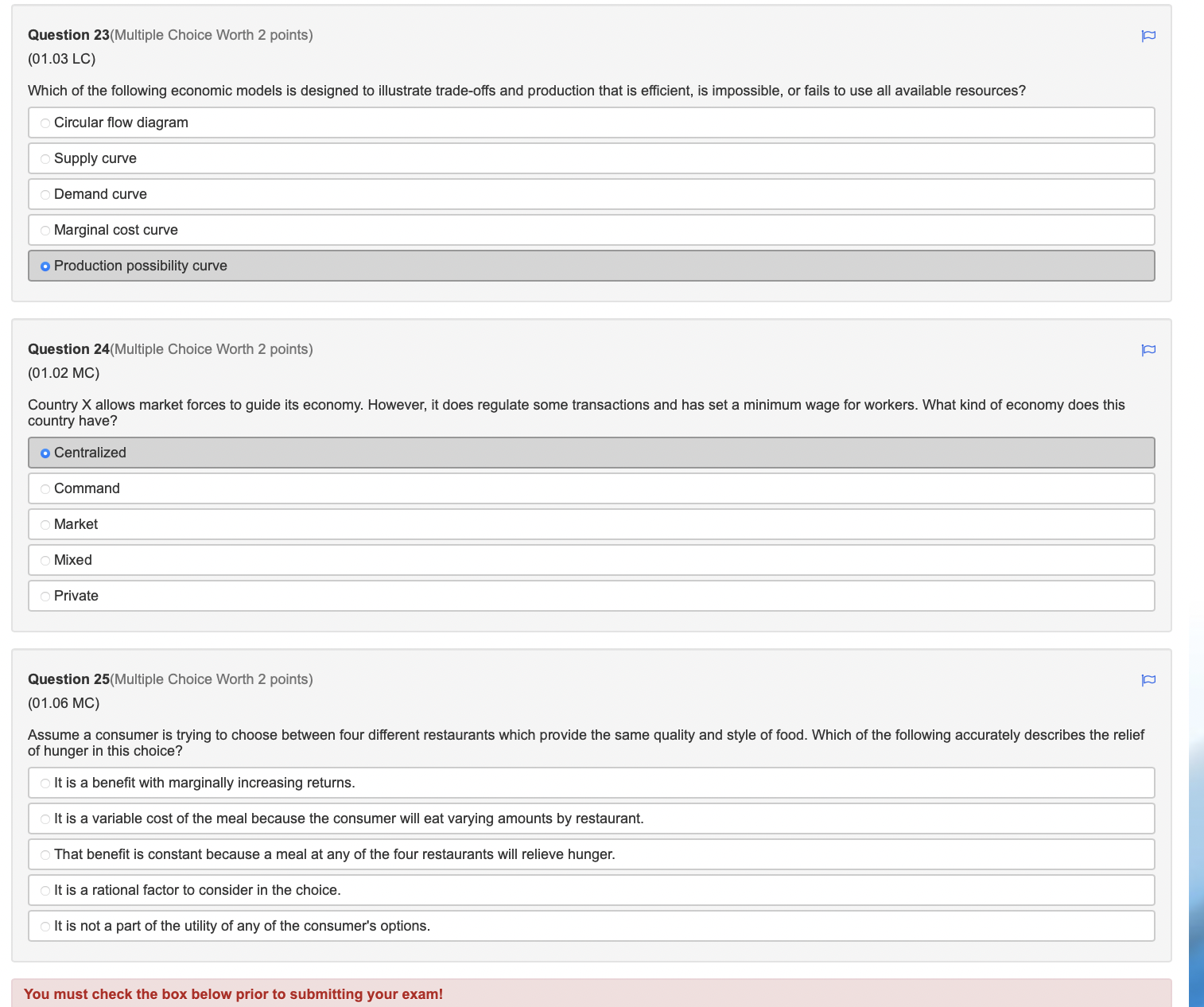
Question 1(Multiple Choice Worth 2 points) (01.06 HC) The following table shows the marginal utility that Renee receives from consuming hamburgers and hotdogs. Hamburgers Consumed Marginal Utility of Hamburgers Hotdogs Consumed Marginal Utility of Hotdogs 18 5 6 IN 2 5 3 3 4 2 2 - N 18 Assume that Renee has $15 of income and uses all her income consuming hamburgers and hotdogs. If the price of a hamburger is $3 and the price of a hotdog is $1.5, what combination of hotdogs and hamburgers will maximize utility for Renee? 5 hamburgers and 0 hotdogs 4 hamburgers and 2 hotdogs o 3 hamburgers and 4 hotdogs 2 hamburgers a 1 hamburger and 8 hotdogs Question 2(Multiple Choice Worth 2 points) (01.06 HC) Below is the total benefit Michelle estimates she would get for eating handfuls of dried cranberries in one sitting. Number of Handfuls Total Benefit (dollars) $2.00 $3.50 $4.50 $5.00 $5.25 $5.00 $4.00 If there is no cost to Michelle for a handful of dried cranberries, what is the optimal number of handfuls for her to eat? 2 3 5 0 6Question 3(Multiple Choice Worth 2 points) (01.05 MC) The graph below shows the marginal benefit a consumer would receive for different quantities of a good. $6 $5 Price $3 $2 Quantity Anastasia pays for a number of pizzas according to the total benefits or total value she gets from them. What total benefits does she get when she consumes 4 pizzas? $0 $5 $9 $12 O $14 Question 4(Multiple Choice Worth 2 points) (01.03 MC) Use the graph to answer the prompt. Product 1 Product 2 The market above could consume at point B with but would need in order to produce there. trade; economic growth more supply; more demand government intervention; alternative inputs inputs; outputs . economic growth; tradeQuestion 5(Multiple Choice Worth 2 points) (01.03 MC) Use the graph to answer the prompt. Good A Good B The shape of this production possibility curve illustrates that the producer's resources are equally suited to produce good A and good B that it would be inefficient to produce only good A or only good B the increasing opportunity cost of changing production from A to B or vice versa constant opportunity cost for producing A and B decreasing marginal utility for the consumption of both goods Question 6(Multiple Choice Worth 2 points) (01.01 MC) Which of the following is an example of a non-rival good? Fireworks for everyone in their sightline A toll road A glass of water Seats at a movie theater O An unclaimed spot on a beach Question 7(Multiple Choice Worth 2 points) (01.06 LC The foundational principle of consumer choice theory is that people make choices in order to O maximize their total utility minimize costs consume the highest quantity for the least price compete with other consumers experience diminishing marginal benefitsQuestion 8(Multiple Choice Worth 2 points) (01.05 LC) According to economists, which of the following describes the optimal choice for a given set of options? o The choice that minimizes cost The choice that maximizes benefits regardless of costs The choice that maximizes net benefits The choice that equally distributes resources among all goods Any point that is productively efficient on a PPC Question 9(Multiple Choice Worth 2 points) (01.05 MC) In the country Gamma it takes 6 hours to produce one automobile and 1 hour to produce a bale of cotton. In the country Delta it takes 10 hours to produce one automobile and 2.5 hours to produce a bale of cotton. Which of the following is true? The countries cannot benefit from specialization and trade Delta has an absolute advantage in producing cotton and a comparative advantage in producing automobiles Delta has an absolute advantage in producing both automobiles and cotton. Gamma has an absolute advantage in producing both goods and a comparative advantage in producing cotton. Gamma would benefit from trading between 6 automobiles for one bale of cotton. Question 10(Multiple Choice Worth 2 points) (01.05 HC) Use the production possibilities table below to answer the following question. Assume constant opportunity costs for Steven and Matthew. Units of Cheese in a Day Fish in a Day Steven 10 25 Matthew 30 10 Which of the following would be mutually beneficial terms of trade for both Stephen and Matthew? Steven offers Matthew 1 fish for 2 units of cheese. Steven offers Matthew 1 unit of cheese for 2 fish Matthew offers Steven 1 fish for 3 units of cheese. Matthew offers Steven 1 unit of cheese for 3 fish. They cannot benefit from trade. Question 11(Multiple Choice Worth 2 points) (01.03 MC) A production possibility curve would if the availability of an input increased and would if new technology increased production efficiency. shift outward; shift inward not move; shift outward not move; not move shift outward; shift outward shift inward; shift inwarQuestion 8(Multiple Choice Worth 2 points) (01.05 LC) According to economists, which of the following describes the optimal choice for a given set of options? o The choice that minimizes cost The choice that maximizes benefits regardless of costs The choice that maximizes net benefits The choice that equally distributes resources among all goods Any point that is productively efficient on a PPC Question 9(Multiple Choice Worth 2 points) (01.05 MC) In the country Gamma it takes 6 hours to produce one automobile and 1 hour to produce a bale of cotton. In the country Delta it takes 10 hours to produce one automobile and 2.5 hours to produce a bale of cotton. Which of the following is true? The countries cannot benefit from specialization and trade Delta has an absolute advantage in producing cotton and a comparative advantage in producing automobiles Delta has an absolute advantage in producing both automobiles and cotton. Gamma has an absolute advantage in producing both goods and a comparative advantage in producing cotton. Gamma would benefit from trading between 6 automobiles for one bale of cotton. Question 10(Multiple Choice Worth 2 points) (01.05 HC) Use the production possibilities table below to answer the following question. Assume constant opportunity costs for Steven and Matthew. Units of Cheese in a Day Fish in a Day Steven 10 25 Matthew 30 10 Which of the following would be mutually beneficial terms of trade for both Stephen and Matthew? Steven offers Matthew 1 fish for 2 units of cheese. Steven offers Matthew 1 unit of cheese for 2 fish Matthew offers Steven 1 fish for 3 units of cheese. Matthew offers Steven 1 unit of cheese for 3 fish. They cannot benefit from trade. Question 11(Multiple Choice Worth 2 points) (01.03 MC) A production possibility curve would if the availability of an input increased and would if new technology increased production efficiency. shift outward; shift inward not move; shift outward not move; not move shift outward; shift outward shift inward; shift inwarQuestion 8(Multiple Choice Worth 2 points) (01.05 LC) According to economists, which of the following describes the optimal choice for a given set of options? o The choice that minimizes cost The choice that maximizes benefits regardless of costs The choice that maximizes net benefits The choice that equally distributes resources among all goods Any point that is productively efficient on a PPC Question 9(Multiple Choice Worth 2 points) (01.05 MC) In the country Gamma it takes 6 hours to produce one automobile and 1 hour to produce a bale of cotton. In the country Delta it takes 10 hours to produce one automobile and 2.5 hours to produce a bale of cotton. Which of the following is true? The countries cannot benefit from specialization and trade Delta has an absolute advantage in producing cotton and a comparative advantage in producing automobiles Delta has an absolute advantage in producing both automobiles and cotton. Gamma has an absolute advantage in producing both goods and a comparative advantage in producing cotton. Gamma would benefit from trading between 6 automobiles for one bale of cotton. Question 10(Multiple Choice Worth 2 points) (01.05 HC) Use the production possibilities table below to answer the following question. Assume constant opportunity costs for Steven and Matthew. Units of Cheese in a Day Fish in a Day Steven 10 25 Matthew 30 10 Which of the following would be mutually beneficial terms of trade for both Stephen and Matthew? Steven offers Matthew 1 fish for 2 units of cheese. Steven offers Matthew 1 unit of cheese for 2 fish Matthew offers Steven 1 fish for 3 units of cheese. Matthew offers Steven 1 unit of cheese for 3 fish. They cannot benefit from trade. Question 11(Multiple Choice Worth 2 points) (01.03 MC) A production possibility curve would if the availability of an input increased and would if new technology increased production efficiency. shift outward; shift inward not move; shift outward not move; not move shift outward; shift outward shift inward; shift inwarQuestion 12(Multiple Choice Worth 2 points) (01.01 LC) Which of the following makes trade-offs necessary? Diminishing marginal returns Diminishing marginal utility Limited resources and unlimited wants and needs Different opportunity costs An excess of supply Question 13(Multiple Choice Worth 2 points) (01.06 LC) According to rational consumer choice, what will happen to the optimal quantity of consumption for a good if the price increases? It will increase along with total utility. It will decrease It will increase. It will be unaffected. Insufficient data to determine on 14(Multiple Choice Worth 2 points) (01.02 MC) Which of the following questions helps leaders of business firms determine resource allocation? Who consumes the goods? Which people most need the goods or services? Is the opportunity cost of resources constant or increasing? How much money do people have to pay for the goods or services? Are the resources used to produce the goods scarce? Question 15(Multiple Choice Worth 2 points) (01.05 LC) Which of the following accurately defines total net benefits? The difference between total benefits and total costs The sum of all benefits for a given choice The total benefits minus the sum of all other foregone alternatives The total benefits minus only implicit costs O The sum of benefits for all alternative choicesQuestion 16(Multiple Choice Worth 2 points) (01.06 MC) Justin spends all his money on surfboards and food. His last surfboard purchased cost $500 and his last unit of food cost $5. Based on this, if Justin is acting rationally, which of the following is true? Justin fails to recognize that surfboards are a luxury and food is a necessity to survive. o Justin gains a higher marginal utility from the surfboard than from the food. Food is more scarce than surfboards There is a higher demand for surfboards than from food. gained more total utility from food than from surfboards. Question 17(Multiple Choice Worth 2 points) (01.05 LC) The benefits to businesses are known as _ and the benefits to consumers are known as revenues; utility profits, revenues incentives; revenues O subsidies; taxes o utility; profits Question 18(Multiple Choice Worth 2 points) (01.06 MC) Below shows the total utility Susie enjoys based on eating different quantities of miniature chocolate donuts. Miniature Powdered Donuts Consumed Total utility (utils) 12 20 26 29 5 28 6 25 Based on the table above, what is the marginal utility of the third chocolate donut? 3 utils 6 utils 20 utils 26 utils 58 utilsQuestion 19(Multiple Choice Worth 2 points) (01.04 MC) A producer can produce a good at lower unit cost than any other producer. For that good, the producer must have a comparative advantage diminishing marginal utility beneficial terms of trade to offer an absolute advantage more factors of production Question 20(Multiple Choice Worth 2 points) (01.03 MC) How would economic growth be reflected on a production possibility curve? Movement along the curve Not reflected on the PPC Shift outward of entire curve Shift inward of entire curve Stretching along a range of the curve Question 21(Multiple Choice Worth 2 points) (01.05 MC Johnson won a free ticket to tour around the world in one year, but he will have to resign from his job. Which of the following is correct if he does cost-benefit analysis? The tour provides only benefits The only cost will be paying for food. There is no opportunity cost to be considered. The cost of the lost income is equal to the benefit of the free ticket. The result may lead to a sub-optimal choice if opportunity costs are not considered. Question 22(Multiple Choice Worth 2 points) (01.04 HC Using all of their resources, Company A can make either 100 computers or 50 cell phones while Company B can make either 200 computers or 150 cell phones. If both companies have the same quantity of resources, then has an absolute advantage in computers while _ has a comparative advantage in cell phones. Neither; both Company A; Company B Company B; Company A Company A; Company A Company B; Company BQuestion 23(Multiple Choice Worth 2 points) (01.03 LC) Which of the following economic models is designed to illustrate trade-offs and production that is efficient, is impossible, or fails to use all available resources? O Circular flow diagram Supply curve Demand curve Marginal cost curve o Production possibility curve Question 24(Multiple Choice Worth 2 points) (01.02 MC) Country X allows market forces to guide its economy. However, it does regulate some transactions and has set a minimum wage for workers. What kind of economy does this country have? o Centralized O Command O Market Mixed O Private Question 25(Multiple Choice Worth 2 points) (01.06 MC) Assume a consumer is trying to choose between four different restaurants which provide the same quality and style of food. Which of the following accurately describes the relief of hunger in this choice? It is a benefit with marginally increasing returns. It is a variable cost of the meal because the consumer will eat varying amounts by restaurant. That benefit is constant because a meal at any of the four restaurants will relieve hunger. It is a rational factor to consider in the choice. O It is not a part of the utility of any of the consumer's options. You must check the box below prior to submitting your exam
Step by Step Solution
There are 3 Steps involved in it

Get step-by-step solutions from verified subject matter experts


